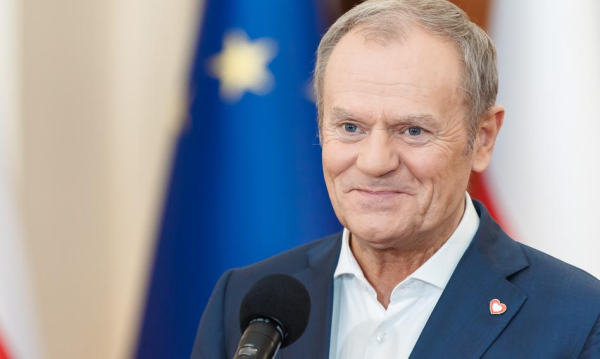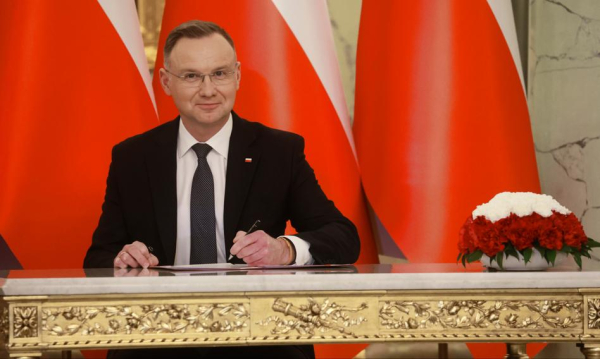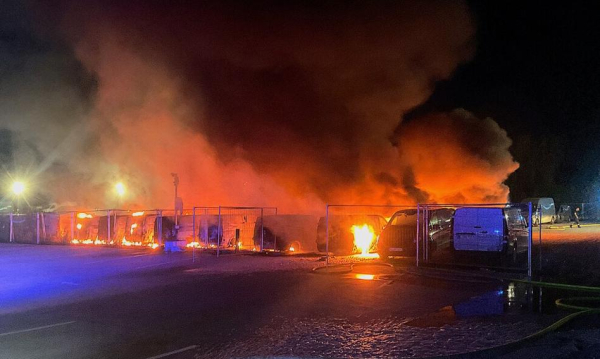At Wednesday's meeting of the National Security Council, the issues that unite us were discussed, and the discussion was very substantive; the discussions were “with the feeling that this is a matter of our national security,” the head of the Left club, Anna Maria Żukowska, told journalists.

Wednesday's meeting of the National Security Council was devoted to energy security, including in the context of the recent blackouts on the Iberian Peninsula, and the upcoming NARTO summit in The Hague.
The head of the Left club, Anna Maria Żukowska, told journalists after the meeting that during the National Security Council they discussed issues “with the feeling that this is an issue of our national community, our national security”.
“I can say that these were indeed things that unite us, about which the discussion was very substantive,” Żukowska noted. “These are matters that really unite us beyond divisions and that in groups such as the National Security Council, there is such agreement,” she stated.
Asked if she was satisfied with the course of the talks, she expressed hope for more in-depth talks on the issues raised during the meeting. She reported that during the meeting she spoke about the navy, among other things. “I think there is also a need to focus not only on the air or land forces, but also on investing in the navy,” said Żukowska.
The Left MP was also asked about the presence of the president-elect Karol Nawrocki at the National Security Council. As she pointed out, Nawrocki's statement after welcoming Andrzej Duda was short. “It was not yet his position of a political nature,” Żukowska noted.
She also expressed hope that this is not the last meeting of the Council before the end of the current president's term (which will take place on August 6). “Perhaps there will be another RBN before the end of the term,” she said.
The president calls for changes to the constitution
President Andrzej Duda stressed after the National Security Council meeting the importance of unity in security matters between individual authorities. The National Security Council was there so that the entire political scene could see this unity, assess it and express its opinion on it – he added.
The President also appealed to the Parliament to adopt as soon as possible an amendment to the Constitution regarding the introduction of a minimum level of defence spending of 4 percent of GDP.
After the meeting of the National Security Council, President Duda noted that it was “highly probable” that this would be the last Council he would convene; as he said, he had therefore invited President-elect Karol Nawrocki to attend. He added that he had invited Nawrocki to help him get up to speed and “so that he could already build up knowledge on issues that are among the most important from the point of view of the security of the Republic of Poland”. He also expressed hope that such conduct would become a tradition.
The president also stressed the importance of unity in security matters between individual authorities. “This Council was held, among other things, so that the entire political scene could see this unity, assess it and express its opinion on it. I am glad that it took place – as always – in such a substantive formula, a good and objective discussion; the questions of the parliamentary side were answered,” he said.
“We discuss important and serious matters seriously and attentively, with deliberation; these areas remain outside of sterile political disputes. If there is a dispute, it is of a substantive nature,” the president assured. He also thanked the participants of previous sessions of the National Security Council for equally substantive and constructive talks.
Duda recalled that he proposed securing the level of spending on military security in Poland, i.e. introducing a provision into the Constitution of the Republic of Poland to allocate at least 4 percent of GDP for defense spending. The president reiterated his appeal to all parliamentary clubs, the Speakers of the Sejm and Senate, for his proposal to change the constitution to be passed as soon as possible.
The meeting of the National Security Council was devoted primarily to the upcoming NATO summit. One of the topics of the summit will be the issue of the obligation of member states to allocate more funds for security. The proposal of NATO Secretary General Mark Rutte assumes that 3.5 percent of GDP should be allocated to defense and 1.5 percent of GDP to other security-related issues.
The president recalled that Poland spends almost 5 percent of its GDP on defense and “there is no problem on our political scene with consensus on this issue.” He noted, however, that not all NATO countries are satisfied with the conditions proposed by the Secretary General. “We hope that this increase, which we proposed over 1.5 years ago, will be accepted despite various sceptical voices,” Duda added.
He emphasized that he was going to the summit as the head of state, but the Polish delegation would also include Deputy Prime Minister, Minister of National Defense Władysław Kosiniak-Kamysz, and Minister of Foreign Affairs Radosław Sikorski. As he noted, each of them “has their own tasks to perform” at the summit, and Wednesday's National Security Council was an opportunity to coordinate activities.
Hołownia: There was an intense political “sparring”
Sejm Speaker Szymon Hołownia said that he assessed the National Security Council session very positively. The part devoted to security and the NATO summit was “full of information,” he noted. He added that the meeting also saw “intense political sparring” between some politicians.
The Speaker of the Sejm informed journalists that due to his duties he had to leave the National Security Council before the end of the session.
Hołownia admitted that during the meeting “of course there was an intense dispute or political sparring between some politicians”. However, as he added, a significant part of the meeting in which he participated, i.e. the one devoted to security issues and the NATO summit, was “full of information” from Prime Minister Donald Tusk, Deputy Prime Minister, Minister of National Defense Władysław Kosiniak-Kamysz and Minister of Foreign Affairs Radosław Sikorski.
“It was really important that we heard what we heard,” Hołownia told journalists in the Sejm. He expressed hope that the session would prove to be “a soil on which to grow that politicians continue to speak with one voice in matters of security and key importance to the state.”
Nawrocki: Energy security is a pillar of sovereignty
President-elect Karol Nawrocki, who participated in Wednesday's meeting of the National Security Council, assessed that Poland's energy security is a pillar of the sovereignty and stability of our economy. It is coal, nuclear and common sense – not the Green Deal – he added.
After the RBN meeting, Nawrocki thanked President Andrzej Duda for the invitation. He also emphasized that energy security is a pillar of sovereignty and economic stability for him.
“I would like to thank President Andrzej Duda for the invitation to the meeting of the National Security Council. Poland's energy security is a pillar of the sovereignty and stability of our economy,” wrote the president-elect on Platform X. “It's coal, nuclear power and common sense – not the Green Deal written in Brussels. Poland must be energy independent!” added Nawrocki.
Zandberg: We need to speed up investment in nuclear energy
The level of political conflict that we have in Poland is not good for large energy investments – assessed on Wednesday the co-chairman of Razem, MP Adrian Zandberg after the meeting of the National Security Council. According to him, Poland is threatened with a production gap if we do not accelerate investments in nuclear energy.
After the meeting, Zandberg assessed that the challenge that Poland currently faces is to answer the question: “to what extent are we able to secure energy investments in the long term so that subsequent changes in power do not overturn them?”
According to the leader of Razem, Poland is threatened by a production gap, because old coal-fired power plants will soon be decommissioned due to technological wear and tear, and at the same time the construction of the first nuclear power plant in the country is delayed. “This means serious problems for both the economy and the stability of social life, if we do not only not accelerate investments, but also do not ensure their continuity and durability,” the MP emphasized in a conversation with journalists.
In Zandberg's opinion, the potential energy crisis is a consequence of the 20-year war between PiS and PO. “Security is also resilience to crises, and the key element is the resilience of the power system, but also ensuring safe electricity supplies – not only in the perspective of a year or two, but also in the next decade,” he said.
“We cannot allow further changes of power – which will happen because that is simply the logic of Polish democracy – to overturn the agreement and postpone the implementation deadlines. I went to today's meeting with this message. I believe that the level of political conflict that we have in Poland is bad for large investments,” added the MP.
Prime Minister Tusk: We must maintain unity and full cooperation
Prime Minister Donald Tusk said after the meeting of the National Security Council that he asked that after the change of the President of the Republic of Poland, unity and full cooperation in security matters be maintained. I will do everything to ensure that this good principle, which provides the foundations for Poland's security, remains in force – he added.
The Prime Minister stressed that he pursued a consistent policy with President Andrzej Duda on security issues, transatlantic ties, and the situation in Ukraine.
“Both President Duda and I, throughout these years of cooperation, sometimes disputes, but we continued the invaluable principle of broad consensus, broad agreement of all major political forces and state institutions when it comes to national security, NATO, relations with Russia, Ukraine and the EU,” Tusk emphasized.
He added that after the change of the President of the Republic of Poland, if possible, unity, consensus and full cooperation in the matters of security, defence, NATO, Ukraine and Russia should be maintained.
“I will do everything to ensure that this good principle, which provides the foundations for Poland's security, that we have a unanimous opinion here, continues to apply to the government, the prime minister, the president and the main political forces,” Tusk said.
As he said, the first test was Wednesday's meeting of the National Security Council and the upcoming NATO summit in The Hague, although Poland will still be represented there by President Andrzej Duda. “In The Hague we will once again confirm that Poland has a uniform, coherent view on security matters. At the next meeting, where Poland will be represented by the new president, I expect confirmation of this uniform, common Polish position on security matters,” said the head of government.
Prime Minister Donald Tusk, in his statement after Wednesday's National Security Council, also announced that he had proposed to all political leaders in Poland the creation of a cross-party field of cooperation in the field of energy security.
“I would very much like us to agree with the main actors in the Polish political scene on matters of broadly understood energy security that the energy strategy will be continued and will be common,” said Tusk.
He emphasized how important investments in energy security are for the future of the country. “When deciding to build nuclear power plants, we are making investments not only for tens, but hundreds of billions of zlotys. Decisions that will require consistency not for a term of office, but for at least a decade,” the head of government noted.
The Prime Minister proposed that the most important politicians in Poland “use these two years without any elections to build a common field when it comes to the largest, key energy investments”.
Nawrocki to Tusk: Lechia Gdańsk unites us
The Prime Minister said that during the National Security Council meeting, “they exchanged a rather obvious remark with the president-elect”. “It is our duty and we have to get used to each other, these are the rules of the game. And we will cooperate in many areas, one way or another, if the whole matter of the elections reaches a happy conclusion,” said the head of government.
“The president-elect noticed that despite all the differences, one thing definitely unites us, namely Lechia Gdańsk, which is hard to deny. It is quite a strong bond, so it cannot be underestimated,” he joked.
Tusk stressed that he and Nawrocki are aware that “the overriding interest of everyone in Poland is that state institutions, regardless of whether they love each other or not, must cooperate on key matters.”
He noted that he had raised two such key issues at the NSC meeting – broadly understood national security in the context of the NATO summit, the war in Ukraine, the war between Iran and Israel, and energy security. He emphasized that these two issues are interconnected.
The meeting of the National Security Council was also attended by, among others, Prime Minister Donald Tusk, Marshals of the Sejm and Senate Szymon Hołownia and Małgorzata Kidawa-Błońska, Ministers of Interior and Administration Tomasz Siemoniak, Minister of National Defense Władysław Kosiniak-Kamysz, Minister of Foreign Affairs Radosław Sikorski, as well as heads of parliamentary clubs and groups. The meeting was also attended by the Chief of the General Staff of the Polish Army, General Wiesław Kukuła.
The previous meeting of the National Security Council – devoted to Poland’s security in the current international situation – took place on 24 February this year, on the third anniversary of the Russian invasion of Ukraine.
The National Security Council is an advisory body to the president on matters of internal and external security of the state. It is composed of: the marshals of the Sejm and Senate, the prime minister, the heads of: the Ministry of Foreign Affairs, the Ministry of National Defense and the Ministry of Interior and Administration, the minister-coordinator of special services, the heads of groups with a parliamentary club, parliamentary group or parliamentary group (or the chairmen of these clubs or groups), the heads of the Chancellery of the President and the National Security Bureau. The president convenes the meetings of the Council, and he also determines their topics. (PAP)
nl/ par/






